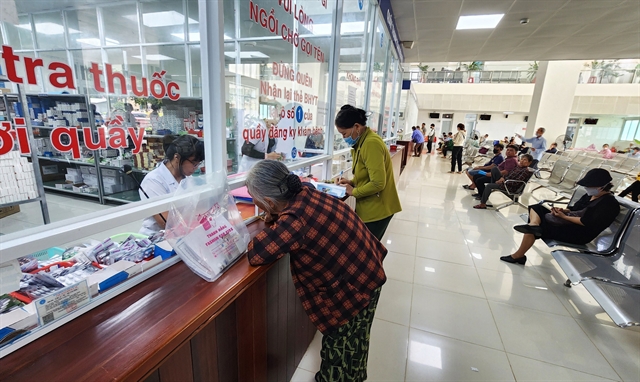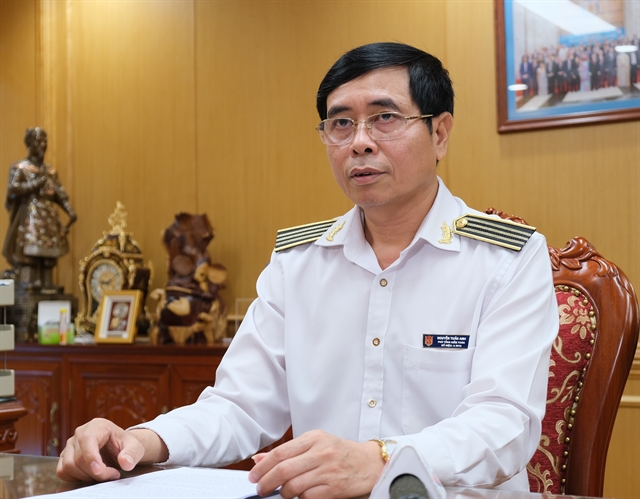 Opinion
Opinion

Deputy Auditor General of the State Audit Office of Việt Nam (SAV), Nguyễn Tuấn Anh, talks to Vietnam News Agency about his office’s contributions in strengthening independent external oversight on the achievement of nationally agreed goals

|
| Deputy Auditor General of the State Audit Office of Việt Nam, Nguyễn Tuấn Anh. — VNS Photo Hồng Minh |
Deputy Auditor General of the State Audit Office of Việt Nam (SAV), Nguyễn Tuấn Anh, talks to Vietnam News Agency about his office’s contributions in strengthening independent external oversight on the achievement of nationally agreed goals
What are the key contents of the Moscow Declaration on the role of each Supreme Audit Institution (SAI) in countries to strengthen the oversight on the achievement of nationally agreed goals? How has the State Audit Office of Việt Nam (SAV) realised the declaration in Việt Nam?
The Moscow Declaration is an important document, adopted at the 23rd Congress of the International Organisation of Supreme Audit Institutions (INTOSAI) in September 2019 in Russia.
This can be considered a manifesto of the international public audit community, affirming the strong commitment of SAIs and INTOSAI in further strengthening accountability, transparency, good governance, efficient use of public funds and reinforcing the value and benefits of SAI.
The declaration identifies three key strategic solutions to shape the future of development of SAIs and INTOSAI, of which the most important one is the need for SAI to strengthen independent external oversight on the achievement of nationally agreed goals including those related to the United Nations’ Agenda for Sustainable Development to 2030.
As for the action plan to implement the Moscow Declaration, it is not new for the SAV. The SAV has implemented the audit of the key projects and national target programme (NTP) projects early and achieved significant results in recent years.
The SAV agrees with the conclusions of the 23rd INTOSAI Congress. As the co-chair as well as an active member of the Asian Organisation of Supreme Audit Institutions (ASOSAI) in 2018-21, the SAV will continue to make more efforts to contribute to the realisation of the Moscow Declaration. The SAV will act as a bridge, popularising for the public servants and auditors of the SAV and other stakeholders the contents of the declaration and incorporate the contents into our annual and medium-term plans. At the same time, we will make efforts to improve the legal basis, enhance the capacity of the audit team and apply advanced science and technology in audit activities to improve the quality of audit work.
You have mentioned that before joining the signing of the Moscow Declaration, the SAV had already made significant efforts in realising the national goals in each period. Can you talk more about this?
In recent years, the SAV prioritised resources and focused on auditing key projects and NTP projects at the request of the National Assembly, the Government and donors.
Annually, the SAV focuses its resources on auditing the NTP projects under the central and local funds through stages such as the National Target Programme on Sustainable Poverty Reduction, the National Target Programme on Employment and Vocational Training, the Target programme of Socio-economic Development of Regions in 2016-20 promulgated under the Prime Minister's Decision No1256/QĐ-TTg in 2017.
The SAV has also been a reliable and strategic partner of international development organisations and partners in the audit of NTP projects with foreign funding, such as the Danish International Development Agency, the Canadian International Development Agency, the Embassy of Ireland and the World Bank.
Particularly for the World Bank, SAV is the first supreme audit agency in Asia to become a strategic partner in conducting audits under the results-based programme.
Through audits, the SAV helped save thousands of billions of đồng for the State, complete and strengthen the legal framework and enhance the accountability of the leaders of the competent authorities related to the implementation of the programme. We have also supported donors and beneficiaries to ensure the compliance with the standards on quality, efficiency and effectiveness of the implementation of programme activities, as a basis for the programme or project to be disbursed conveniently and effectively and in compliance with the law.
For national key projects, the SAV focuses on auditing investment projects in the form of public-private partnership (PPP). This is an important source of capital mobilisation in Việt Nam and it contains many shortcomings and loopholes in terms of mechanisms and policies.
Through audits, the SAV has made bold audit recommendations, including a proposal to reduce the payback period by 300 years compared to the original plan of 86 audited Build-Operate-Transfer (BOT) projects from 2016 to 2020, proposed financial settlement of over VNĐ4 trillion (US$186.3 million), conducted financial settlement of over VNĐ12.5 trillion ($556 million) for 65 Build-Transfer (BT) projects audited in the same period.
What are challenges facing the SAV in auditing national key projects and NTP projects?
Firstly, on May 10, 2017, the Prime Minister issued Decision No 622/QĐ-TTg on the National Action Plan to implement the 2030 Agenda for Sustainable Development, according to which, an important task in 2020 is to fully integrate Việt Nam's sustainable development goals into the annual Socio-Economic Development Strategy, development strategies, policies and planning of ministries, sectors, localities and agencies. This means that the ambitious sustainable development goals will be detailed into national goals across all sectors and state agencies. Therefore, in the near future, the audit scope of the SAV will be expanded and become much more complicated in the context of limited resources and quality.
Secondly, the SAV's audit activities for PPP projects still face many difficulties due to the incomplete legal corridor. The revised Law on State Audit, which took effect in July 2020, and the Law on Investment in PPP Method, was just enacted in June 2020, specifying the role of the SAV in auditing PPP projects. The SAV has to adjust and revise the system of regulations and documents guiding the audit in accordance with these two laws.
Thirdly, along with the rapid development of the Fourth Industrial Revolution, big data applications, artificial intelligence, digital technology and cloud computing, audit activities also need more efforts and better preparations in terms of the facilities, information technology equipment and training of people, combining the application of advanced science and technology.
What are the SAV’s directions and solutions to pursue the Moscow Declaration and better play the role of SAI for the achievement of national goals in the future?
Firstly, we will perfect the synchronous legal corridor, making a favourable basis for audit activities, ensuring the independence of the SAV. In particular, we will focus on amending and adjusting the detailed guidelines of the SAV in this area towards compliance with the Law on State Audit and the Law on Investment in PPP Method.
Secondly, we will focus on training and strengthening the professional capacity of the auditors of the SAV, equipping and updating the audit experience knowledge in each field, advanced science and technology applications, gradually change audit methods and skills to meet the increasing requirements of audit tasks on advanced scientific and technological platforms.
Thirdly, we will strengthen inspection and control to ensure the quality of audits.
Fourthly, we will strongly promote the application of operational audits to assess the economy, efficiency and effectiveness of national target policies and programmes. We will enhance the presence and actively participate in the policy-making process, develop the Government's programme, national key projects as providers of consulting specialised services and ideas.
Finally, we will strengthen international integration and co-operation activities to share and learn experiences with SAIs, accounting associations, regional and world auditors in auditing public policies and national key and target programmes. At the same time, we will update and complete the audit standards in accordance with good practices and international accounting and auditing standards in order to standardise the audit work of the SAV. — VNS




